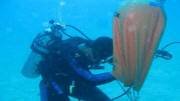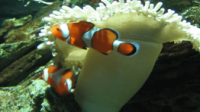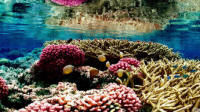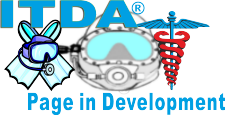ITDA Research Diving
Available as a Sports Scuba / Technical Diver "Specailist Program" at level 1. or the L1 plus Level 2. (L2) The programs were designed to offer would be "Research Divers", the basic skills and introduce research diving techniques and equipment that are required for safe working divers... Also available as an Advanced Research Diver... "Occupational Diver Program".
 About
the ITDA Research Diver Programs
About
the ITDA Research Diver Programs
The ITDA Research Diver program is based on the NOAA (National Oceanic and Atmospheric Administration) Some refer to NOAA as the NASA of the underwater world and in many ways they are.
1. Levels 1 & 2 To Offer Sports / Recreational divers an
opportunity to learn about this very interesting area of
diving and perhaps to get involved in unpaid expeditions
for experience and to be “useful” members of a research
team.
Level 3, Advanced “Research Diver”. This level is to train and certify Research Divers for use in Scientific and Research paid Diving Projects all over the world offering both practical and advanced diving skills.
The ITDA Group has always been at the forefront of safer diving training and our programs are aimed to challenge and demand a great deal from our members in a safe and fun training environment under expert supervision of highly qualified and experienced Instructors and Trainers.
Why a Research Diver Program?
Simply because many Colleges, Universities, Institutes and other government and non-government agencies are using or have used Sports Scuba Divers or even club or federation divers who are NOT properly trained for research diving i.e. recreational certified divers.
For many divers such "Diving Projects" may include extended bottom times, some requiring decompression (due to accumulated time underwater) Not just because of the depth... Diver's may get DCS (Decompression Sickness) from diving repetitive dives to just 10m/33ft. i.e. even shallow reef may represent a hazard that many recreational divers are NOT trained to recognise or manage...
So we have developed our unique RESEARCH DIVER programs... Which also includes an Introduction to Marine Sciences.
Types of Research Diving
- Fish ID
- Reef Conditions Studies / Human Impact
- Reef / Coral Pollution and Damage Studies
- Coral growth and development
- Coral grading
- Study of Black band Disease and other diseases that kill Corals
- Study of types of Coral and Marine Life Interactions
- Many more....
Diving Skills / Standards Level 1. (2 to 3 days)
I. Basic Diving Skills Assessment: (Mask & Snorkel, BCD, Swimming Skills in full gear to 200m)
II. Buoyancy Skills Workshop session: Controlled Decent & Ascent, Hovering 3mins, trimming weights, and in-water position adjustment without impacting buoyancy… Forward and backwards rolls, airplane position to sitting position and back, forwards and backwards. Controlled layout of underwater work area. Laying weighted lines or other materials to make a small (1sqm.), search area for examination of fine objects. (exercises are to be practiced in depths from 3m/9ft. to 20m/66ft.) Min.2 Dives.
III. Navigation Assessment: Find an object underwater from a Compass bearing and mark off the location. Lead your instructor on a 360 degree tour out and back from a start point for 100m. Lead your instructor out and back on a 180 degrees heading for 200m. Demonstrate use and mastery of basic navigation skills. Min. 2 Dives.
IIV. Search & Recovery Assessment: Search for and Locate / Recover Safely an object set by your instruction team using lifting safe techniques… You must mark the location on a map in the case of needing further research. Min. 2 Dives. 30m/100ft & 12m/40ft.
V. Finally a Search & Rescue / Missing Diver Exercise: To include; a location and recovery from a minimum depth of 20m/66ft. With slow ascent and stops at 9m and 6m. and EAR and CPR on the Surface / Back at base or boat… may be performed on last open water training dive… 6 Dives over 3 to 4 days…
Diving Skills / Standards Level 2. (3 Days)
IBasic Diving Skills Assessment: (Mask & Snorkel, BCD, Swimming Skills in full gear to 250m, Surface Rescue of Tired Diver with tow 200m & EAR last 50m) Surface Rescue Skills ONLY…
II. Buoyancy Skills Workshop session: Assessment ONLY… Controlled Decent & Ascent, Hovering 5mins. As in section 1. 1 Dive for assessment with instructor supervised skills, maximum depth 30m/100ft..
III. Navigation Skills. Assessment ONLY: Find an object underwater from a Compass bearing and mark off the location. Lead your instructor on a 360 degree tour out and back from a start point for 100m. Lead your instructor out and back on a 180 degrees heading for 200m. Demonstrate use and mastery of basic navigation skills. 1 Dive from 6m to 30m. Adding simulated decompression for 10mins at 30m.
IV. Search & Recovery Assessment: Search for and Locate / Recover Safely an object set by your instruction team using lifting safe techniques… You must mark the location on a map in the case of needing further research. 2 Dive(s) with deco to a depth of NOT LESS THAN 25m…
V. Simulate a research 2
dive project: To analyse a reef problem and to
record marine life interaction. Also make notes for
examination and analysis of all your activities… 2
Decompression Dives to 25m+ with Nitrox as a deco mix at
9m of 50/50%... 6 Dives over 3 to 4 days.
NOTE ON
DECOMPRESSION: Level 1 may simulate deco but level 2
must practice it!
Advanced Research Diver
Standards (3 to 4 days)
(3 to 4 days)
Academic Standards (Section 1 and 2 MUST be completed
prior to Section 3. Advanced Level.)
As contained in
section 2 of the ITDA Research Diver manual a more
complete understanding is required of: Decompression
Theory (from the ITDA Decompression Diver Manual),
Search & Recovery (From the ITDA Specialist level in our
Advanced Diver Program), and section 3, “Research
and Scientific Diving”. Covering different
types of research diving and an Introduction to
Scientific Diving.
Diving Skills Assessment: (Mask & Snorkel, BCD, Swimming Skills in full gear to 300m/330yards. Surface Rescue of Tired Diver with tow 200m/220 yards & EAR last 75m/82 yards) Surface Skills ONLY…
II. Buoyancy Skills Workshop session: Assessment ONLY… Controlled Decent & Ascent, Hovering 5mins. As in section 1. 1 Dive for assessment with instructor supervised skills, maximum depth 40m/132ft...
III. Navigation Skills. Assessment ONLY: As in section 2. 1 Dive from 6m/20ft. to 30m/100ft. Adding decompression for 10mins at 30m/100ft.
IIV. Search & Recovery Assessment: As in section 2. 2 Dive(s) with deco to a depth of NOT LESS THAN 25m…
V. Organise & Plan a Research Dive project: To analyse reef problems, eco systems and human impact and to record marine life interaction… Including setting up a habitat and observation. Also making notes and recording for examination and analysis of all your activities… UW Video Skills for recording may be added to the level 2 or Advanced Level as an additional certification...
x2 Air Dives Non-Decompression and x2 Decompression Dives to 25m/83ft.+ with Nitrox as a deco mix from 9m/30ft. of 36% mix. With 8 Dives over 3 to 4 Days…
NOTE ON DECOMPRESSION: Level 3 must practice; planning and executing safe decompression diving, team-diving and safety planning!
PAGE IS IN CONTINUED DEVELOPMENT
PLEASE BOOK MARK TO RETURN or Email us with any questions: admin@diveitda.com

ITDA and IHMP, training scuba diving, advanced and
technical, training professional divers, from diver to
instructor, plus IHMP first-aid and IHMP instructor,
plus, our unique divepro opportunity.
Our Office Locations
ITDA EU HQ - TP-129 Todo Express, Avenida de
Constitucion #31
Competa, 29754
Malaga.
Spain EU.
Mail us Directly
Contact gina
gcadmin@diveitda.com
Mon -
Thursday,
9:30-7:00pm
Friday - Saturday, 10am to 1pm.
Sundays and Holidays - Closed
Company Details
ITDA Group International Inc. Ltd.
CEO
Contact Steve
stevecm@diveitda.com
COO
Contact Gina
gcadmin@diveitda.com
Office Locations
2...
C/O Atrix Business Services. ITDA Group International Inc. Ltd. 2003, 20/F, Tower 5, China Hong Kong City. 33 Canton Road, TsimShaTsui, Kowloon, Hong Kong (SAR China).
ITDA and IHMP, training
scuba diving, advanced and technical, training
professional divers, from diver to instructor,
plus IHMP first-aid and IHMP instructor, plus,
our unique divepro opportunity.